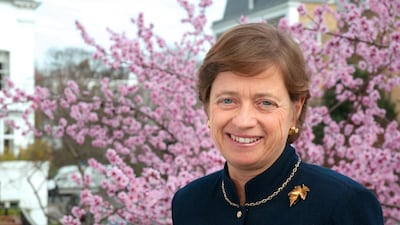One of the more whimsical calls of the global Occupy movement was “tear down the hedges”. The protesters mean the multibillion dollar hedge fund industry, in their eyes (and those of many less partial observers) one of the main reasons for the great financial crisis of 2009 and many of the subsequent woes of the world.
For others in the financial world, the faults of the funds were apparent even before the crisis fully burst, with the supposed “sorcerers” of the financial world accused of charging too much for merely average advice and investment performance, and enriching hedge fund managers at the expense of investors.
Something had to be done to trim the hedges back to size, and regulators across the world began to look at ways to impose tougher rules on an industry well known for lack of transparency and even – in some high-profile legal action in the US – full-blown illegality.
Into this maelstrom steps a demure-looking lady from Massachusetts. In her 50s, she looks like a New England schoolteacher whose main hobby is perhaps gardening, but do not be fooled by that exterior. Amelia Fawcett is one of the most experienced and successful of operators in a range of occupations dominated by men – from law to finance to media – and she usually comes out on top.
Now the hedge funds are well in her sights, and she was recently in the UAE and the Arabian Gulf as part of her bid to persuade the big investors of the region to sign up to her plan for the hedges to make themselves more accountable, transparent and better governed – before regulators and prosecutors do it for them.
“Sunshine is a great disinfectant, so the more you expose to the sun, the cleaner and more transparent you are,” she says, perched in an armchair in the lobby of one of Abu Dhabi’s grander hotels.
Amelia Fawcett (her formal title is Dame through awards of British honorary titles, although she often goes by just plain Miss) is head of the Hedge Fund Standards Board (HFSB), an organisation set up in 2008 to “do something” about the hedges.
By the time she took over in 2011, criticism of hedge funds had reached a new crescendo, and she was seen as exactly the type to see through some permanent change.
Her CV for the role is impressive. A lawyer by training, she went on to senior executive positions at the big American investment bank Morgan Stanley (former colleagues remember her as “pugnacious and tough”) before taking up jobs with, among others, the British Treasury and the Bank of England, as well as a number of high-profile philanthropic and charitable roles.
More or less simultaneously, she was chairman of Guardian Media Group, the British media outfit that was negotiating the difficult transition from the age of print to the digital era. Co-workers there describe her as “persistent and dedicated”.
The task in the Gulf, as she sees it, is to persuade the big investing institutions of the area to sign up to HFSB standards and drag the industry into the new, transparent era.
Even though the hedge fund industry in the Middle East is in its infancy compared to that of Europe and the US, regional investors make up an increasing proportion of the cash going into foreign hedge funds.
She elaborates: “Some of the biggest investors in hedge funds in the US and Europe are from the Middle East. So the hedge funds listen to them. They have to get a seat at the table to help drive strategy.
“The big sovereign wealth funds and other investors don’t need help in investing, but we can help them distinguish between good and better investments. Our argument is that a big SWF is more likely to invest in a fund if it is signed up to HFSB, and that of course also makes it more of an incentive for the fund to sign up,” she explains.
What exactly are they expected to sign up to? “The basic principles are: comply or explain, in which regulations are agreed and infractions become an issue of enforcement. Then investors become partners of HFSB. Standards are internationalised and applicable in the US and everywhere else in the world. Then if a hedge fund makes a change on strategic or commercial terms, it has to make them public,” she says.
Another vital piece of the strategy involves the regulatory regime. “We tell the regulators and the central banks we are neutral and that we aim to be setting new standards. We keep them aware of what’s going on in the hedge fund industry; and we provide a means of dialogue between regulators and investors. We’re not against regulation, just over-regulation,” she says.
It was her first trip to the Arabian Gulf region, and she had followed talks in Qatar and Bahrain with top-level meetings in Abu Dhabi involving some of the top investors there. “Abu Dhabi feels very different. You can talk to people here, and they want to listen,” she says.
“I’d like to come back to see the rest of the Gulf, especially Dubai and Kuwait, because it’s certainly a fascinating place with a young hedge fund industry and lots of growth potential.”
fkane@thenational.ae
Follow The National's Business section on Twitter

